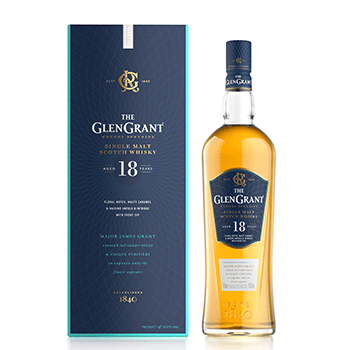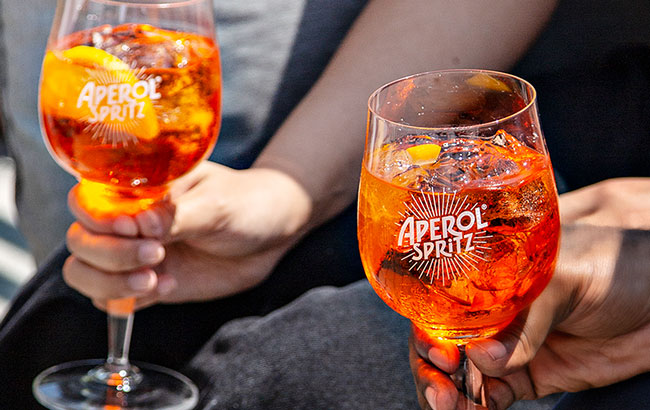The big interview: Leigh Irvine, Campari Group
Leigh Irvine, managing director of Campari Group’s global travel retail arm, tells us how his team has weathered the pandemic shutdown and how realising long-term goals is the key to success in the channel.

*This feature was originally published in the October 2021 issue of The Spirits Business magazine.
It was during his university days that the wine and spirits world piqued the interest of Leigh Irvine. “I was a little bit without direction, shall we say,” he recalls. While studying for his French degree at UCLA in London, UK, Irvine spent his third year abroad in France, and found himself working “in a little wine shop/restaurant. The owner was such a character, and he really embraced me and a friend, and we ended up doing lots of interesting stuff with local people in the wine business,” Irvine recalls.
After graduation, Irvine “had no other burning desire” so opted to pursue a career in the wine trade. “I soon discovered that it’s fuelled by passion,” he says.
While working in a wine shop in London after graduating, he spotted an advert for a buyer role in travel retail with a company now known as Nuance, after being acquired by Swiss Air. “I had no duty free experience; I had no idea about the channel and was very lucky to get the role,” he adds. That has certainly changed.
From there, Irvine went on to work with some of the world’s leading drinks firms, including a year as regional manager for Maxxium UK, where he worked on brands including Scotch whiskies The Macallan and Famous Grouse, and Absolut vodka. In 2000, he moved to World Duty Free as a senior buyer for seven years, before joining Bacardi as regional director, travel retail Europe West, then progressing in the firm to regional director, Americas travel retail. “I instantly fell in love with the industry,” he says.
Challenging role
Today, Irvine is managing director of the global travel retail (GTR) arm of Campari Group, famed for its eponymous apéritif brand. It’s a role that has been particularly challenging in the past 18 months, in a channel that all but shut down during the Covid‐19 pandemic. “We’re a team of 22 people who are solely dedicated to GTR, so we are small in comparison with the competition,” he notes. “We take pride in the fact that we punch above our weight, but we’ve also got plenty of room to grow; that’s the plan over the next five‐year period, to really take the size of the team, and the size of the business forward in a positive way.”
In Campari Group’s full‐year 2020 financial report, while the company posted ‘resilient’ results, net sales dipped by 4.1% organically (down by 3.8% on a reported basis).
Thankfully, sustained growth in off‐trade-skewed markets such as the US, Canada, Australia and Northern Europe was able to mitigate ‘weakness’ in on‐trade‐led regions, mainly Italy, and the GTR channel. In the Southern Europe, Middle East and Africa regions, for example, GTR declined by 68.9%, more than offsetting double‐digit growth in countries such as France.
Happily, the company’s results for the first half of 2021 demonstrated a strong bounceback from the struggles of last year. In the first six months of the year, Campari Group saw organic net sales soar by 37.1% compared with the same period in 2020 – a 22.3% increase on the first half of 2019. In Southern Europe, Middle East and Africa, GTR sales grew by 24.3% after the initial lifting of travel restrictions.
“The initial phase [of the pandemic] was incredibly frustrating because we were on a massive roll,” Irvine says. “The momentum we had [before the pandemic] was really gratifying. We saw brands that we’d put in place gather pace over time, and, come the end of 2019 and early 2020, were at top speed. We were the fastest‐growing business in GTR. The results that were focused on in 2019 were on two main brands: The Glen Grant and Aperol.”

He says The Glen Grant single malt “came from nowhere to be the fastest‐growing whisky over the course of a 12‐month period”, while Aperol is “just on the edge” of the top 20 brands in GTR. “They just smashed it out of the park,” Irvine enthuses.
He believes The Glen Grant was able to bring some “newness” to the category in GTR. “But you can’t just show up and be ‘new’ and be successful; we have to have a call to action, another reason to talk to consumers about why they should buy into The Glen Grant,” Irvine says.
“We base our communications all around liquid credentials, basically getting liquid to lips, talking about the awards the brand has to provide reassurance.”
He says The Glen Grant saw “amazing numbers” in the US, South America, and Asia, where “the more aged variants did a fantastic set of numbers”.
European performance
When it comes to Europe, he says performance can differ significantly from place to place, but notes: “We had great success in the UK and Spain,” and also highlights its popularity in Israel.
“I wouldn’t say there was anywhere in particular that was the main driving force behind the success, it really was a cumulative effect across all global markets,” he adds.
Aperol, meanwhile, continues to surprise and delight Irvine and his Campari GTR team. “From a volume point of view, we’re over two million litres now within the channel; it really is going crazy at the moment,” Irvine reveals. “For 2019, we were the 26th‐biggest spirits brand in the channel.”
GTR is known for its limited edition, exclusive bottlings – but Aperol is somewhat of an anomaly, relying on its iconic orange-coloured core expression to attract travellers.
“Aperol breaks all the rules of travel retail, if you think that 75% of the spirits category is dark spirits,” Irvine explains. “It’s based on high‐alcohol content. Whereas our approach is low‐alcohol, it’s everyday consumption. It really is a phenomenon.”
The issue with this is GTR’s category split is, understandably, skewed towards dark spirits and other key categories. “If you go to an airport, you will see the merchandising is laid out for the consumer by sub‐category. You’ll see whisky together, Cognac together, gin together, etc,” he explains. “If you add all those things together you’ve got about 95% of the business.”
Everything that doesn’t “fit neatly” into whisky, Cognac, gin or vodka “tends to sit at the back. We tend to find ourselves crammed with merchandise and Tequila, or anything on the bottom shelf in the corner,” Irvine says.
“Yet despite this, it’s hitting the numbers, and that’s being driven a lot by promotional activity. So if we can drive those numbers when it’s hidden at the back, there has to be a win‐win opportunity for us and the operators by pulling the brand forward. There’s clear demand – it’s clearly being sought by the travelling consumer.”

One way the brand ensures it not only taps into its loyal, orange‐obsessed fan base is by creating GTR packs to entice new Aperol Spritz drinkers.
“We introduce it in a twin pack with Prosecco, with simple‐to‐follow instructions of how you put the drink together to make a perfect Aperol Spritz,” Irvine explains. It’s clear this is still only the start of Aperol’s potential in GTR, and Irvine is “super‐excited about what the future looks like”.
The next biggest sub‐channel in GTR is the cruise industry, he says, and his team is eager to tap into the potential of drinking occasions on board cruise liners.
“The core consumption moments on board a cruise ship are around the pool during the day, or the pre‐dinner drink when you go out in the evening, which is classic territory when you’re on a cruise ship, or somewhere sunny by the pool,” he adds.
The cruise sector has been on Irvine’s list of ambitions since before the pandemic, but he says growth in the channel is all about ensuring his 22 team members are allocated appropriately. “Aperol has always been the quintessential apéritif,” he asserts. “We see a big opportunity in the channel for the brand. There are others as well, but it’s about having the capacity to cope with something. We’re determined that when we start a project to make sure that we have the ability to complete it. You don’t always get more than one shot.”
Longevity is everything
It’s all about long‐term strategies for Irvine, and his five‐year projection. “Exploiting the hotness of the brand” holds little interest for him – whereas credibility and longevity is everything. “We’re driven by ‘what do we have the capacity to do?’ rather than ‘will the brand be a success in this space?’,” Irvine explains. “We make sure we build a track record with our operating partners so they know that when they give us an opportunity, it’s going to work for everybody. So we’re quite selective and we tread carefully.”
The past 18 months have given Irvine and his team time to rethink the strategy for GTR given the challenges of the Covid‐19 pandemic. Getting liquid to lips is not as easy as it once was, and regaining consumer trust to pick up and taste samples in airports will take time.
While the quality of the liquid inside the bottle will “always be at the core of its appeal”, looks will play an increasingly important role. As such, Campari Group has given The Glen Grant brand a design overhaul.
“Once we come out and we start reactivating the brand [in GTR], it will be about re‐establishing it but with a new look and feel,” Irvine reveals. “The liquid part of the brand will always be at the core of its appeal. But a lot of our work will be about establishing that brand in the mind of the consumer, and it will be a lot more visually focused compared with where we were.”
Related news
Cocktail stories: Speed Bump, Byrdi
